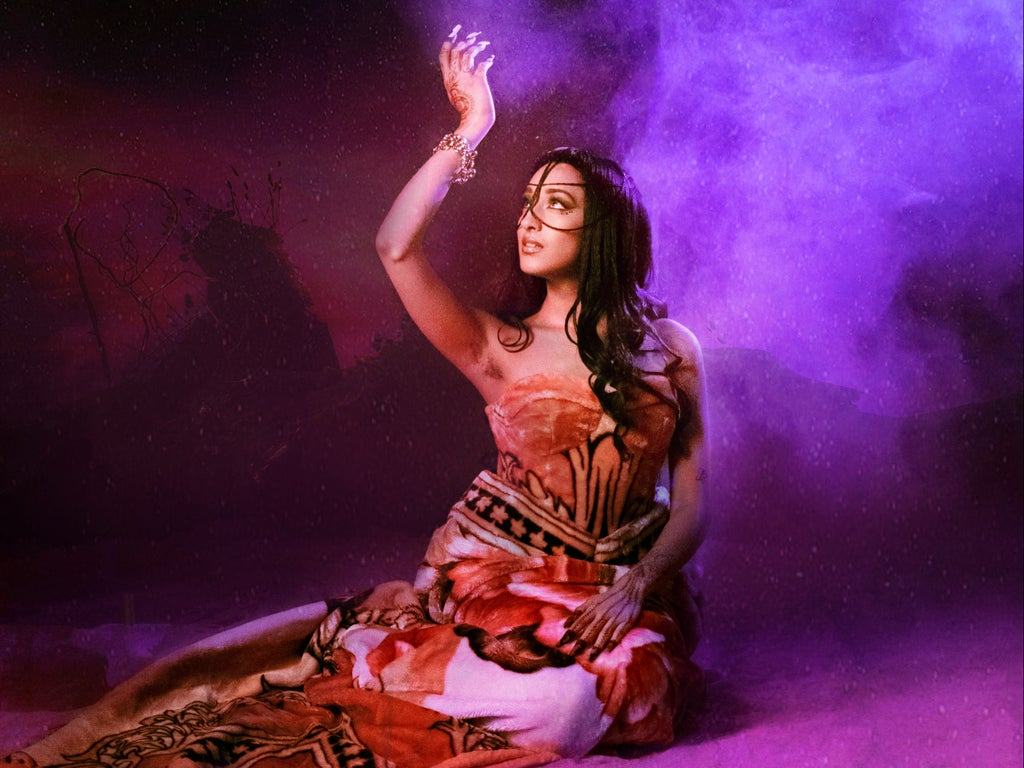
Raveena is a queer, South Asian, female artist who straddles themes of spirituality and sexuality. She’s someone, she says, who “hasn’t existed in mainstream pop music” before. Does she worry this could alienate potential fans? Not at all. “Obviously it’s a bit more challenging for listeners, but I also think they want to be challenged, and experience art that lives outside consumable soundbites,” she says. After two EPs and a debut album, 2019’s Lucid, she felt confident enough to commit to music that is eleborate, yes, but not impenatrable. “One of my closest friends said this really beautiful thing,” she recalls. “‘You made an album that’s so nuanced, and complex, and has so many different facets to it, and layers, and you spent so many years working on it. You have to give people that amount of time to understand it and digest it.’”
Raveena Aurora was born in Queens, New York, into a family who fled their native north India after her maternal uncle was killed in the 1984 Sikh pogrom. “We had a really big Indian family, and I grew up around a lot of Sikh culture,” she tells me over video call from her Los Angeles home. “I grew up in a very religious home, around a lot of spiritual people with deeply ingrained practices.” Her grandfather used to practise reiki – a form of energy healing – on her whenever she had a stomach ache. From a young age, Raveena was taught to tune into the language of the otherworldly and supernatural: “My family members all agree that God lives in nature and space, and that’s what I believe too.”
Her second album, Asha’s Awakening, incorporates those spiritual themes with an exploration of her diasporic identity. “I love to put everyone in uncomfortable positions,” she says serenely. “Whether it’s challenging people in the west to receive South Asians in a new light, or people back home to see women as free, liberated, sexual and queer beings.”
These concepts collide in album opener “Rush”, which opens the portal to a “colourful, weird, friendly” universe, one that was five years in the making. Drawing inspiration from sci-fi films including Flash Gordon and The Arrival – along with old Bollywood movies such as Pakeezah, and the “campy and fun” 1966 drama Madame X – Raveena imagines a space princess from ancient Punjab who transcends time to learn about love, loss, healing and destruction. “In a lot of older Hollywood sci-fi productions, I noticed that the costumes of the alien characters were reminiscent of eastern clothing,” she says, “leading me to the realisation that they kind of saw us as aliens.”
Fresh off the Coachella stage and also booked for this Friday, Raveena is now part of a small group of Indian-origin artists to play a solo set at the free-spirited, two-weekend extravaganza in California. Her Asha’s Awakening collaborator, Grammy-winning rapper Vince Staples, is also performing: their song “Secrets” is “a homage to that early 2000s kinda sound”, spearheaded by Timbaland, Missy Elliot, MIA and Jai Paul.
It’s a sound that peppers the album, simmering alongside influences from celebrated Indian musicians such as RD Burman and Asha Bhosle, and pioneering female jazz artists Alice Coltrane and Asha Puthli. Raveena’s falsetto rings clear, as it always has, but she also utters swooning sighs on “Kismet”, along with quietly confident verses delivered in Hindi, and experiments with Indian instruments such as the harp-like swaramandal. Stronger basslines thump to the beat of her protagonist’s wild heart, crescendoing until the album’s halfway point, when the energy turns contemplative. Once she realises “Time Flies”, the heroine of Asha’s Awakening emerges healed from the “heartbreak of growing out of people” and “the trauma of abuse”. Then her voice is a prayer, a soft whisper – recounting nights of celestial highs – the sound of peace.
The character of Asha was initially conceived for a comic book Raveena created with the help of a professional illustrator. Her journey to self-love is set to the sounds of desi-futurism: “Anyone in the diaspora who’s trying to connect different points of heritage, and influence and culture, is essentially practising desi-futurism in a way,” she explains, of a genre that is increasingly associated with South Asian artists abroad. “Obviously, there are so many different stories to tell within the diaspora, there are so many different experiences just within each region. But I think, with each experience, there’s also a beautiful mosaic being formed.”
While Asha’s Awakening begins with the rhythmic stirrings of “Rush” and the sultry hip-hop allure of “Secret”, it ends with a 15-minute-long guided meditation, “Let Your Breath Become a Flower”. Raveena structured the album just so, with the intention that it would pay homage to her South Asian history, intersecting with western culture: “Starting with really upbeat, colourful, sensual, free songs and then ending on introspective and spiritual ones.”
She sounds unbothered by the fact that she was tipped as “one to watch” by various publications at the beginning of the year. “I just feel like if you get caught up in the cyclone of all that, it’s really detrimental to your mental health as an artist,” she says. She would rather remain detached from how her art is perceived by others: “I had no idea that I would be this gay, and this loud about who I was, and it’s come with a lot of pushback.” But every time she pokes the bear, it’s not without wondering: “What the hell is this going to make people feel?”
‘Asha’s Awakening’ is out now. Raveena plays Coachella festival on 22 April







